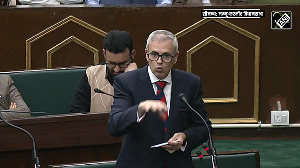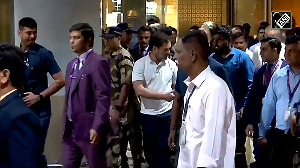It's a brand that has held its price line at Rs 4 for 25 years now -- the price was last raised in 1994 by 25 paise. So, it's not for nothing that Parle-G is the world's largest-selling biscuit by volumes.
Not that the company didn't try to raise prices to offset the overall hike in costs. Three years ago it did so, but quickly rolled it back after volumes fell sharply and consumers wrote to lodge their protest.
"We want to cater to the masses and have consciously tried not to increase the price. Parle-G is available for Rs 50 a kg. There are very few food items that are available for Rs 50-60 a kg," says Pravin Kulkarni, general manager (marketing), Parle Products.
Parle is, of course, not doing it for charity. Soaring input prices meant it opted for reducing the weight of the biscuit than increasing the price -- first from 100 gm to 92.5 gm in January 2008, and then to 88 gm in January this year -- in line with other biscuit-makers and FMCG players.
Regular customers would have noticed the number of biscuits in a pack come down from 16 to 15 even as each biscuit became lighter, but they seemed to understand the cost pressures on the firm. The gamble paid off: Parle was able to sustain its volumes.
Strict cost control at every point in its supply chain also helped -- Parle entered into forward contracts with suppliers, outsourced production, increased the number of manufacturing locations to 60 and consolidated buying.
Raw material costs account for 60 per cent of the total costs in this segment and packaging costs (plastic films) account for 20-25 per cent of this.
Nirmalaya Kumar, professor of marketing at London Business School, feels it's a very smart strategy. "At this price point, price becomes more important than the weight of the biscuit. It's very interesting and similar to the dollar stores in the US," he says.
But price is not its only USP.
What makes the Parle G brand tick is also that it has been positioned on the health platform (a single pack of biscuit offers 450 calories). Its earlier punchline was Parle-G: swadh bhare, shakti bhare (full of taste and energy). Currently, the brand uses two punchlines. Parle-G: G for Genius and Hindustan ki Taakat (the country's strength).
The brand, says Kulkarni, meets different needs of customers: calories (energy), nutrition and value-for-money -- enough reasons why Parle-G enjoys close to 70 per cent market share in the glucose biscuit category and probably has the deepest reach.
It reaches 2.5 million outlets, including villages with a population of 500 people, on a par with Unilever's Lifebuoy, ITC's cigarettes or mobile pre-paid cards.
It's also one of the few FMCG brands in the country, whose customers straddle across income segments.
The brand is estimated to be worth over Rs 2,000 crore (Rs 20 billion), and contributes more than 50 per cent of the company's turnover (Parle Products is an unlisted company and its executives are not comfortable disclosing exact numbers). Last fiscal, Parle had sales of Rs 3,500 crore (Rs 35 billion).
Competition has, of course, been trying to wean away customers from Parle. Britannia relaunched its Glucose-D biscuit as Tiger in 1995 and boasts of 17-18 per cent share, while ITC's Sunfeast glucose has captured 8-9 per cent, according to industry sources.
Even Levers had forayed into this segment in 2003 and launched a glucose biscuit branded as Modern, after it acquired the bakery business of Modern. There are strong regional brands, including Priya Gold (west), Cremica (north) and Anmol (east).
But they still have their work cut out.
Nirmalaya Kumar feels the Parle-G story is so fascinating that it deserves to be a case study. What would be interesting to see is whether it will be able to retain its leadership in the coming years as income grows in the hinterlands and consumers upgrade and develop new tastes.







 © 2025
© 2025